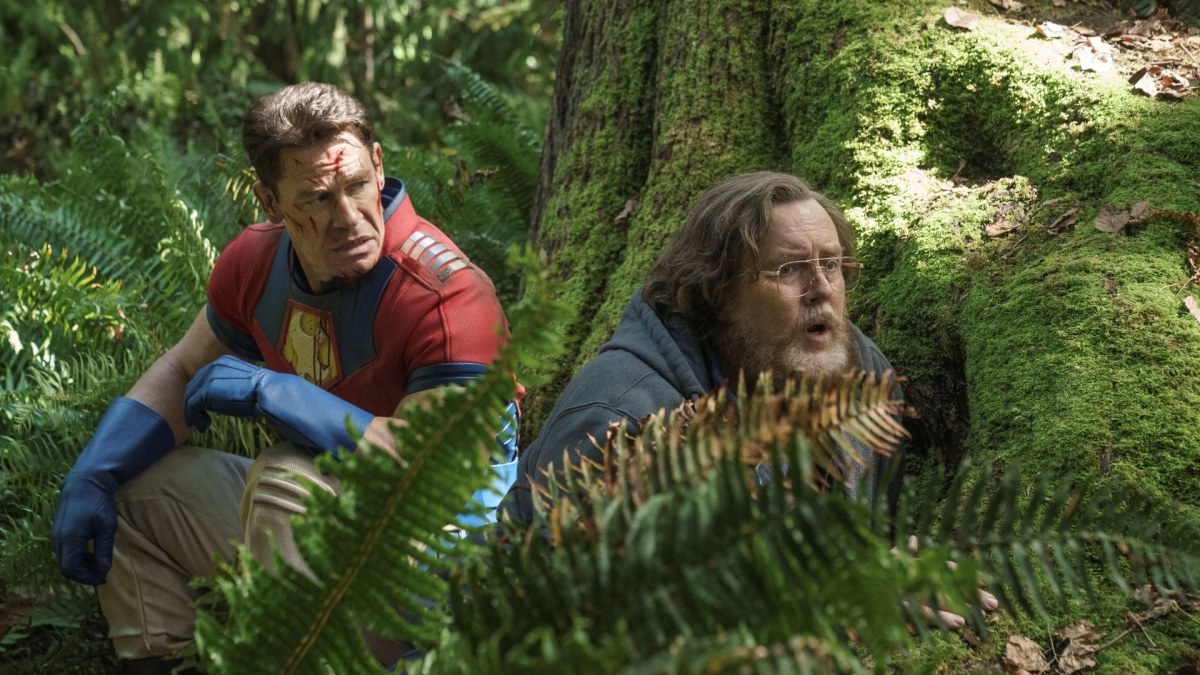This discussion and review contains spoilers for Peacemaker episode 7, “Stop Dragon My Heart Around” on HBO Max.
Music is an essential part of Peacemaker. “Stop Dragon My Heart Around” foregrounds the importance of music to the show. The episode is bookended with characters in dire situations escaping through music. The first scene finds a young Christopher (Quinn Bennett) bonding with his brother Keith (Liam Hughes) through rock music. The last line has Economos (Steve Agee) repeating Peacemaker’s (John Cena) assertion that “there’s no wrong time to rock.”
The show’s soundtrack has attracted considerable attention. Showrunner James Gunn even maintains a Spotify playlist that he updates weekly, including all of the tracks from the show. This isn’t necessarily a surprise. Gunn’s Guardians of the Galaxy garnered a great deal of coverage for its “Awesome Mix” soundtrack, which went on to become the bestselling album in the country and even prompted a re-release on cassette tape.
In recent years, there has been something of a backlash against what might be termed “needle drop” soundtracks — films and television shows that rely heavily on existing music. Sometimes, these musical choices can be a little too on the nose, such as playing “Sympathy for the Devil” to accompany a morally ambiguous protagonist. Sometimes, these musical choices can become so ubiquitous as to become clichés, with Laura Branigan’s “Gloria” appearing absolutely everywhere in the 2010s.
As with any other form of reference in a television show or feature film, the needle drop needs to be deployed with both skill and intent. Like nostalgic callbacks, the most important thing is that these cues exist for some greater purpose than simply existing, to demonstrate something deeper than the pockets of the massive multimedia conglomerate commissioning the work. Good music is cool, but the audience can listen to it on their own time.

Peacemaker justifies its heavy reliance on needle drops by making them essential to the show’s larger themes. Peacemaker isn’t just using these songs for dramatic effect. The soundtrack exists as an extension of the central ideas driving show. If Peacemaker is a story about how anybody can be redeemed and about how children can escape the clutches of abusive parents, then the soundtrack serves as one such catalyst for transformation.
This has always been a theme of Gunn’s work. The Guardians of the Galaxy movies are fundamentally about escapism, about how Peter Quill (Chris Pratt) retreated from the death of his mother (Laura Haddock) into a space opera fantasy like Star Wars, with bubble-wrap spacesuits and arcade game drones. Peter’s Walkman and his “Awesome Mix” serve as both a tether to his absent mother and a means of escaping the pain of reality.
Peacemaker has already foregrounded this theme. Music provided a means for the team to bond with one another, through which Peacemaker could connect with characters like Leota Adebayo (Danielle Brooks) or Emilia Harcourt (Jennifer Holland). In “Monkey Dory,” Peacemaker and Economos seem at loggerheads, unable to resolve their fundamental differences after Economos frames Peacemaker’s father Auggie Smith (Robert Patrick) for Peacemaker’s crimes.
However, on their way to the butterflies’ processing plant, the two spark up a conversation about hair metal. Peacemaker is stunned to discover that Economos is familiar with the genre. “You know Hanoi Rocks?” Peacemaker asks. Economos reveals a tattoo that reads “11th Street Kids,” named after one of the band’s songs. Almost immediately, the tension between the two evaporates. Harcourt even sets up a group chat for the team, named “11th Street Kids.”

Of course, it isn’t just music. “The Choad Less Traveled” featured a sequence of Murn (Chukwudi Iwuji) watching Lethal Weapon 4 alone in his motel room, notably the film’s “laughing gas” sequence. The implication seemed to be that Murn was hoping to use the film as a way of connecting to and understanding people. Even for an alien sitting alone in a dingy motel, art is a way of engaging with both feelings and other people.
At the climax of “Murn After Reading,” Peacemaker sits down at the old piano inside the gang’s headquarters and performs an unlikely acoustic rendition of Motley Crue’s “Home Sweet Home.” It is a moment of crushing emotional vulnerability from a character who has spent all season trying to bury and conceal his emotions. It’s also a track with obvious emotional resonance. For Peacemaker, with his dead brother and abusive father, “Home Sweet Home” is an aspirational fantasy.
“Stop Dragon My Heart Around” underscores this point in its opening scene, which flashes back to Peacemaker’s earliest memories of the song, listening to it with his brother Keith. For Keith, this music is a means of escape. When Keith raises his fist in the air, his younger brother asks, “Is that white power?” Keith responds, “Fuck white power, it’s the devil! It’s rock and roll forever and tongue-kissing hot babes all day!” It’s easy to understand the allure of that to a young teenage boy.
Gunn has talked about art playing a similar, if less dramatic, role in his own life. He’s talked about being an odd kid growing up in a “very Catholic” community. “And so being an odd little kid from the start — for whatever reasons I was odd — it probably was not the most conducive atmosphere for me, for making friends or feeling like I belonged or anything like that,” he has explained. “But it did give me an opportunity to sort of escape into my own little world with comic books and books.”

Obviously, Christopher and Keith have more serious reasons for wanting to escape their racist and abusive father. “I think that some of the rock ‘n’ roll stuff that he’s into has actually been a more positive influence on him than, say, his father has been,” Gunn has stated of Peacemaker’s affection for music. Gunn has also argued, “I think hair metal is where Christopher Smith claimed his own thing that had nothing to do with his father and something that his father hated.”
One of the big recurring themes of Peacemaker has been the extent to which Auggie haunts his son. “Stop Dragon My Heart Around” leans into this, with the revelation that Auggie can track his son using the high-tech helmets that he provides. Even if Auggie isn’t literally inside Peacemaker’s head, he is close enough. “I control you,” Auggie brags to his son in his final moments. “Whether or not I kill you, you’ll never be able to get the fuck away from –”
Auggie’s boast is cut silent when Peacemaker kills him using a Luger pistol that he recovers from one of the dead racists lying nearby. It is fitting that Auggie is an unrepentant racist who is murdered by a piece of iconography indelibly associated with the Third Reich, a gun “synonymous with the German military through the end of World War II.” People make their choices, and those choices lead them to their fates.
Indeed, “Stop Dragon My Heart Around” presents a juxtaposition in its two big deaths, those of Auggie and Murn. Auggie was Peacemaker’s biological father. He was abusive and violent, incapable of seeing any potential in his son. His last action is to threaten and try to murder his child. In contrast, Murn became a surrogate father to his team. His last action is to buy them time and to reassure them of their worth. “I’m proud to have had you on my team,” he tells Leota and Harcourt.

Much like Guardians of the Galaxy Vol. 2 suggests that it was possible for Peter to choose his paternal figure, and that surrogate father Yondu (Michael Rooker) was more of a parent to him than his biological father Ego (Kurt Russell), Peacemaker seems to argue that music and art might have played a similar role in Peacemaker’s life. “Stop Dragon My Heart Around” even suggests that hair metal was a substitute for or a challenge to Peacemaker’s biological father.
Beating his son, Auggie rants about when exactly he realized that he had no use for the boy. “I knew when you listened to that devil music,” he offers as his first moment of such awareness. Peacemaker has his own epiphany later in the fight, confessing, “I’m a piece of shit for listening to you for all these years.” The implication is that Peacemaker should perhaps have spent more time listening to hair metal instead. He probably would have turned out a lot healthier.
The choice of hair metal as the title character’s soundtrack of choice even plays into the broader themes of the show. Gunn has commented on the “androgyny” of the genre, playing into the show’s deconstruction of 1980s masculinity by providing an archetype from the era that contrasts with Peacemaker’s aesthetic. Similarly, if Peacemaker is a reckoning with a very narrow-minded vision of American exceptionalism, it is appropriate that many of these bands are Europeans adopting an exaggerated performance of American stadium rock.
Much like the humanism at the heart of Peacemaker — the idea that everybody can be redeemed — there is something romantic in the show’s embrace of hair metal in particular and art in general. Peacemaker seems to suggest that there is a real and true power in media. It not only offers a means of escape, but also perhaps a path to redemption. It’s a surprisingly sweet and earnest argument that dovetails neatly into the show’s rocking soundtrack.






Published: Feb 10, 2022 12:00 pm